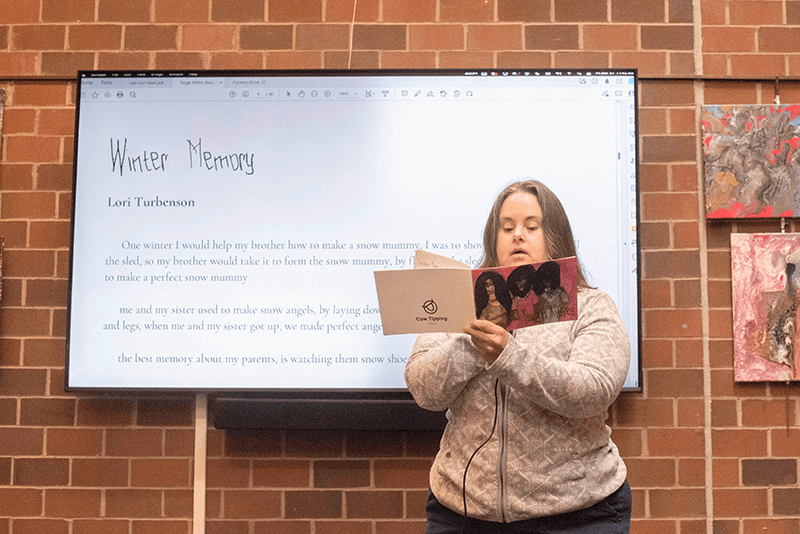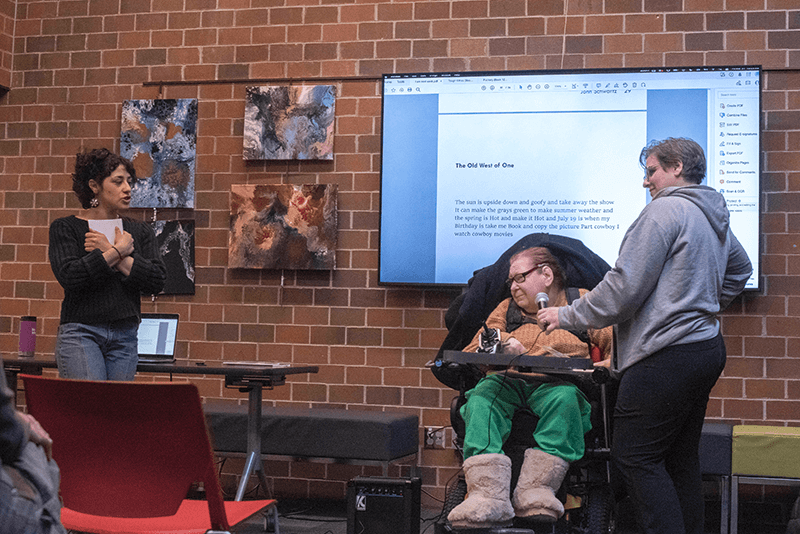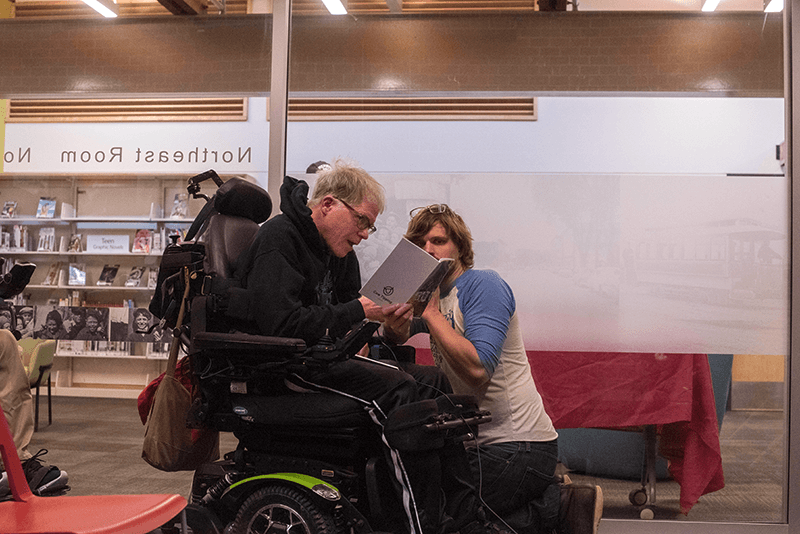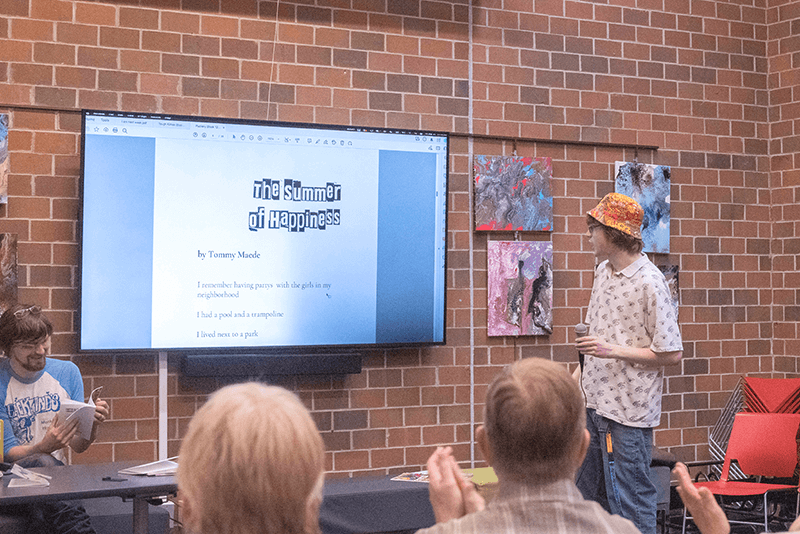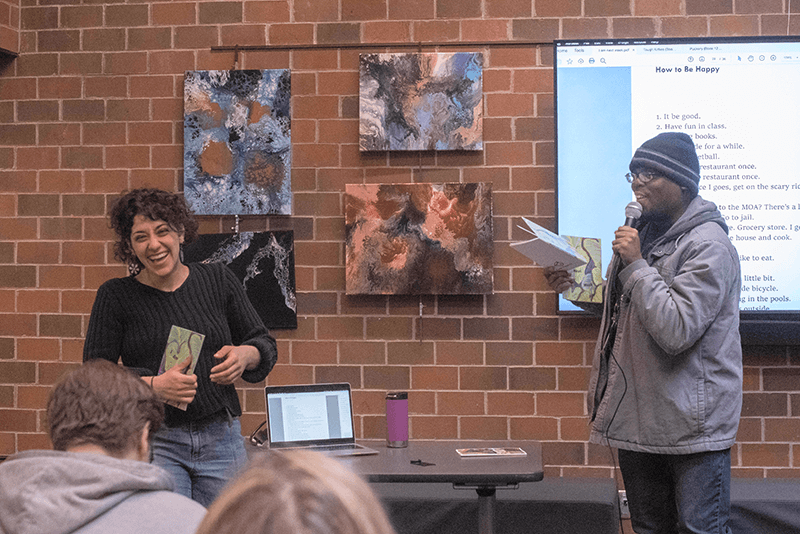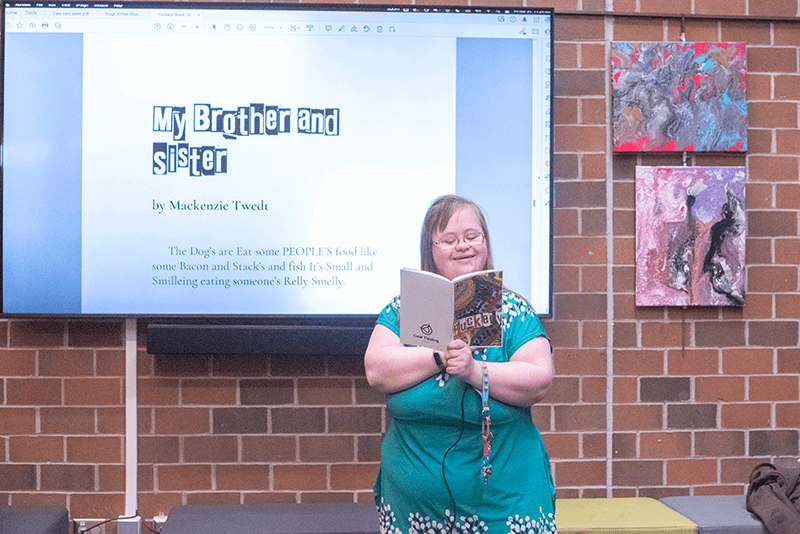Rachel Lieberman of Cow Tipping Press introduced writer Margot Stellmach at a reading sponsored by the press at the Northeast Library. Lieberman read from Stellmach’s bio in the poetry collection “I Am Next Week.”
“She does the play by memory … . She plays all three parts. She plays the producer, the narrator, the director, plus be in the play.” Stellmach then came up in her power wheelchair and read two of her poems, repeating each line after it was read by an assistant.
Here is Stellmach’s prose poem “The Old West of One.”
The sun is upside down and goofy and take away the show it can make the grays green to make summer weather and the spring is Hot and make it Hot and July 19 is when my Birthday is take me Book and copy the picture Part cowboy I watch cowboy movies
“I Am Next Week” was one of three books of poetry presented April 1 by 21 neurodiverse writers. The event and publications were the culmination of classes run by Cow Tipping Press in conjunction with three different agencies, Achieve Services, RISE and AccessAbility. All offer services for adults with intellectual and developmental disabilities.
Cow Tipping Press’s mission is to “change the narrative of disability in practice,” Lieberman told the audience. Classes at the service agencies provide self advocacy, allowing the writers to speak for themselves. The readings offer the opportunity for “folks without disabilities who might not normally engage with groups of people with disabilities often to do so.”
Some of the poems in the three books lean toward the fact-based, as in Al Joen’s “Cinnamon Toast Crunch,” which muses on the amount of sugar in Cocoa Puffs and Captain Crunch, while others deal with complex emotions, or are the fruit of close observation in the presence of others, like Charles Weaver’s “Argument at the Cabin,” in the collection “Tough Kitties,” which draws its title from a line in Weaver’s poem. It’s a dialogue between a “random person” and “another random person.” The poem was received with a lot of chuckles, especially from his family members in attendance.
An excerpt: “Ergh! I don’t wanna do itttt.” “Okay. Tough kitties.” “What? What do we do?” “Well Maybe … well, your attitude’s the problem, and then be quiet.” “What the hell man??” “Well, I wish you’d stop arguing with me, and then being yourself.”
Readings offered a glimpse into writers’ likes and dislikes, what and how they think about things, and their creative imaginations. The poems were either written or dictated by the poets, and they were published exactly as the writers wrote or spoke, with no corrections. All of the poems connect the audience to the poet’s experience in the way that the poet experiences it and expresses it. Rather than only highlighting the differences between the writers and “neurotypical” individuals, the poems connected the two groups through common experiences.
For example, who hasn’t worried, when hosting a party, whether the guests will click with each other? In Tough Kitties, Lori Turbenson’s poem Hang Outs speaks about her concerns about her “hang outs” – what she calls friends who visit her apartment in Coon Rapids, where she lives independently with the support of Opportunity Partners.
“Will my hang outs agree?/Will my hang outs to find things to what they want to talk about?/Will my hang outs get to know each other even if their different?/Will my hang outs act like adults and friends?”
In an interview a week after the reading, Turbenson shared that she has a couple groups of people who regularly hang out at her place – one is a bunch of guys who like to watch wrestling with her, and on Thursdays, she and her friends have music night. These social times provided inspiration for another poem she read, “Guy Language” “Well, it can’t be every guy, because, some guys, have good vocabulary skills … It would be cool if they would use guy handshakes. That I would come up with. With them, to use. They would come up with a guy language that they want, that’s appropriate. For a table conversation.”
Turbenson, who’s 43, has been writing since middle school, she said, and often uses writing to express her feelings. “I’m an emotional girl, and so it’s easy for me to express my emotions.” She said she wrote a lot after the death of her brother in 2001: “More poetry, more expressing, more pouring out my heart. Because it hit me.” She is comfortable sharing her writing with a larger audience, too. She has written short pieces for the National Down Syndrome Congress, and spoke to a conference of doctors and nurses at the University of Minnesota.
For 24-year-old Tommy Meade, writing is a way of helping people who have dealt with addiction like he has. In a later interview, he shared that while it would be cool to have 100 or 1,000 people hear about his story, “I just want one person to see it and I want to inspire somebody to get help.”
Meade has been clean since 2019, and has written long before that, since he was 15 or 16 both in the form of rap songs and prose and poetry. He read from a couple poems in “Puckery,” the collection by RISE clients.
“The Summer of Happiness” is full of good memories: “I had a pool and a trampoline/I lived next to a park/I was a kid doing kid stuff/no worrys [sic] about the future.” His “Survivor of the Trenches”’ talks about “the gelatinous evil energy called Adicction.” “It corrupted my soil … I can’t escape the pain of my past I’m a soldier/in this war,” and ends on a positive note: “Every day I wake up and it’s a blessing … I keep moving forward no matter the cost. I use my experiences to be the best person I am today.”
Brian Boyce is the founder and leader at Cow Tipping Press, and the sibling of a brother with developmental disabilities. He’s on a mission to seek “side-by-side equity for folks like him and me.” “There’s not really another program like it that we know anywhere, which is a shame, because the kind of stories and talents, and you know, quirks and divergences, and heartfelt emotions that everyone has to share, it’s really amazing.”
Cow Tipping Press draws on Boyce’s experiences as a high school teacher in Lesotho and Rosebud Reservation in South Dakota, and running an education program in Orange County, Calif. He said they hire some of their former students to teach in their classes. “It’s really cool and powerful for our students to see them as a leader in front of the classroom and a pathway to meaningful employment that’s integrated into the community.” The organization, funded mainly by arts grants and the fees they charge agencies for the classes, also employs undergraduates to help teach classes. “Then, through the program, we do a lot of intensive coaching and training and professional development. They become better advocates and allies through the process.”
Boyce says he always encourages journalists doing stories on Cow Tipping to go directly to the writers, rather than spotlight him. In that spirit, we’ll end with the strong images and creative imagination of Ashley Williamson in this prose poem in the book “I am Next Week.”
The Shadow Rabbit and the Sunset
The Shadow Rabbit Jumps over the bright reddish-pink sunset and over the sea. She doesn’t really know what she’s doing in the sky, being a rabbit and all. She thinks it’s quite new and strange, but also interesting. She Wonders how she got there, and how to get down again, but Until then, She thinks she’ll Just go With the flow. It’s a Pretty Peaceful evening.
Lori Turbenson read one of her from poems from the collection “Tough Kitties.” Rachel Lieberman (left) asks Margot Stellmach, “If you could put on any production, what would it be?” Stellmach’s answer: “Dancing With Wolves.” Bryan Boyce helped Wyman Groenke read his poem, “Fishing.” Tommy Meade read one of his poems from the collection “Puckery.” Rachel Lieberman and Tavarrus Robinson, along with the audience, enjoyed his answer to one of the author interview questions. Mackenzie Twedt read from her poem “My Brother and Sister,” from the collection “Puckery.” (Photos by Karen Kraco)
